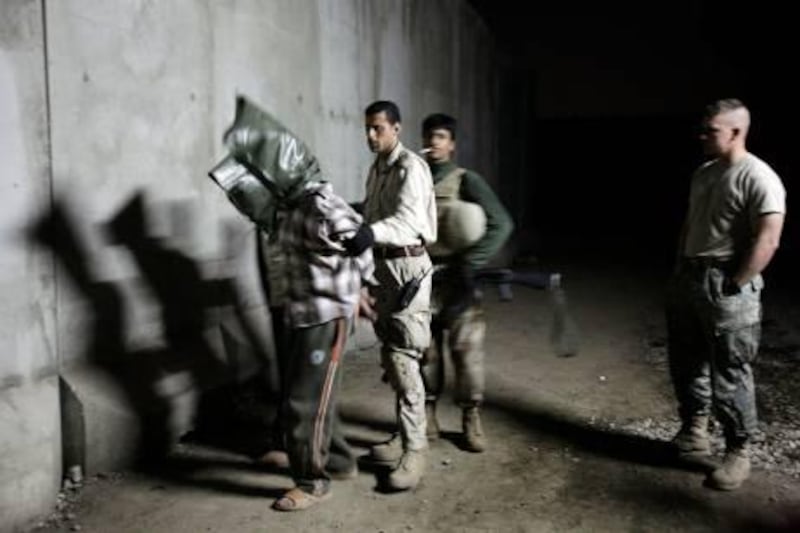Baghdad // Fears grew yesterday of renewed sectarian violence in Iraq after leaked US military files revealed that Iraqi forces have been heavily involved in torture and murder.
Ifan al Issawi, head of the provincial security and defence commission in the Sunni area of Anbar, west of Baghdad, said he expected anti-government violence in the wake of the revelations.
"It will affect the security situation here, in Fallujah, in Anbar and in other parts of the country," he said. "It will raise the feeling of malice against Americans and against the Iraqi forces as well.
"People will want to take revenge; that will make the security situation even hotter."
In Washington, the US military denounced the leak as "shameful". A Pentagon spokesman said it would endanger American troops in Iraq.
The Iraqi authorities have promised to investigate the allegations of abuse in the thousands of classified US documents published by WikiLeaks on Friday. They show that American soldiers documented the systematic mistreatment of prisoners, including women and children, by Iraq's security forces.
Some of the alleged abuse took place while Nouri al Maliki was prime minister, and the revelations increase pressure on him as he fights to remain in office for another term.
Mr al Maliki's office accused WikiLeaks of creating a national uproar by releasing documents that it said were being used "against national parties and leaders, especially against the prime minister". It expressed confidence in "our people's awareness regarding such games or media bubbles that are motivated by known political goals".
It said the documents presented no proof of detainees being improperly treated while Mr al Maliki headed Iraq's Shiite-led government, and praised him as courageous for taking a tough stance against terrorists.
But those comments have done little to deflect the criticism by Mr al Maliki's opponents, particularly those among Iraq's Sunni Arab minority.
Many Iraqis have long complained about government forces, accusing the post-2003 invasion authorities of being as abusive and corrupt as the regime of the deposed president Saddam Hussein. The documents released by WikiLeaks not only appear to confirm the continued widespread use of torture, but also point to complicity by US forces, who failed to prevent it.
That has only added to the sense of outrage among some Iraqis against both US and Iraqi troops. Even some of those who have been supportive of the US presence say they are now disillusioned because they had believed the Americans restrained Iraqi troops. The WikiLeaks documents show that reports of Iraqi torture made by rank-and-file US soldiers were not investigated by the US military.
Manfred Nowak, the UN's special rapporteur on torture, said the US president, Barack Obama, should examine the claims against American troops.
"There is an obligation to investigate whenever there are credible allegations torture has happened - and these allegations are more than credible - and then it is up to the courts," he said.
Mohammad Qassim, a resident of Zafarinyah, south of Baghdad, said the WikiLeaks revelations make him want to seek revenge. He said two of his adult sons were killed in the kitchen of his home during a night raid by Iraqi and US forces last year. Mr Qassim has always maintained the deaths were murder, despite official denials.
Although his case does not appear to be mentioned in the leaked files, he said the documents proved Iraq's forces were out of control.
"People didn't believe me when I told them what had happened, but now maybe they will," he said.
Other families who lost loved ones said the US military files had confirmed their worst fears. Khalid Ferhan, from Taji, has not been able to find his brother since he was arrested by a joint Iraqi-US force in 2008.
"I still don't know if he is alive or dead," he said.
In Baghdad, Rasim al Marwani, a senior member of the anti-US Sadrist movement, said the American military files confirmed that "a river of blood" had been flowing in Iraq.
"We have been saying this for the past seven years," he said.
The US authorities had consistently denied keeping track of Iraqi casualties, something the classified files show was not the case. In fact, US records put the death toll at 109,000 between 2003 and 2009, including more than 15,000 civilian deaths that were previously not reported.
The leaked documents also reveal US fears about Iranian involvement in arming and supporting militias and political groups. Fadila, one of the parties accused of being controlled by Tehran, denied carrying out a pro-Iranian programme in Iraq.
Susan al Sa'ad, a Fadila MP, warned the country would be destabilised by the revelations.
"I expect the security situation will now get worse," she said.






